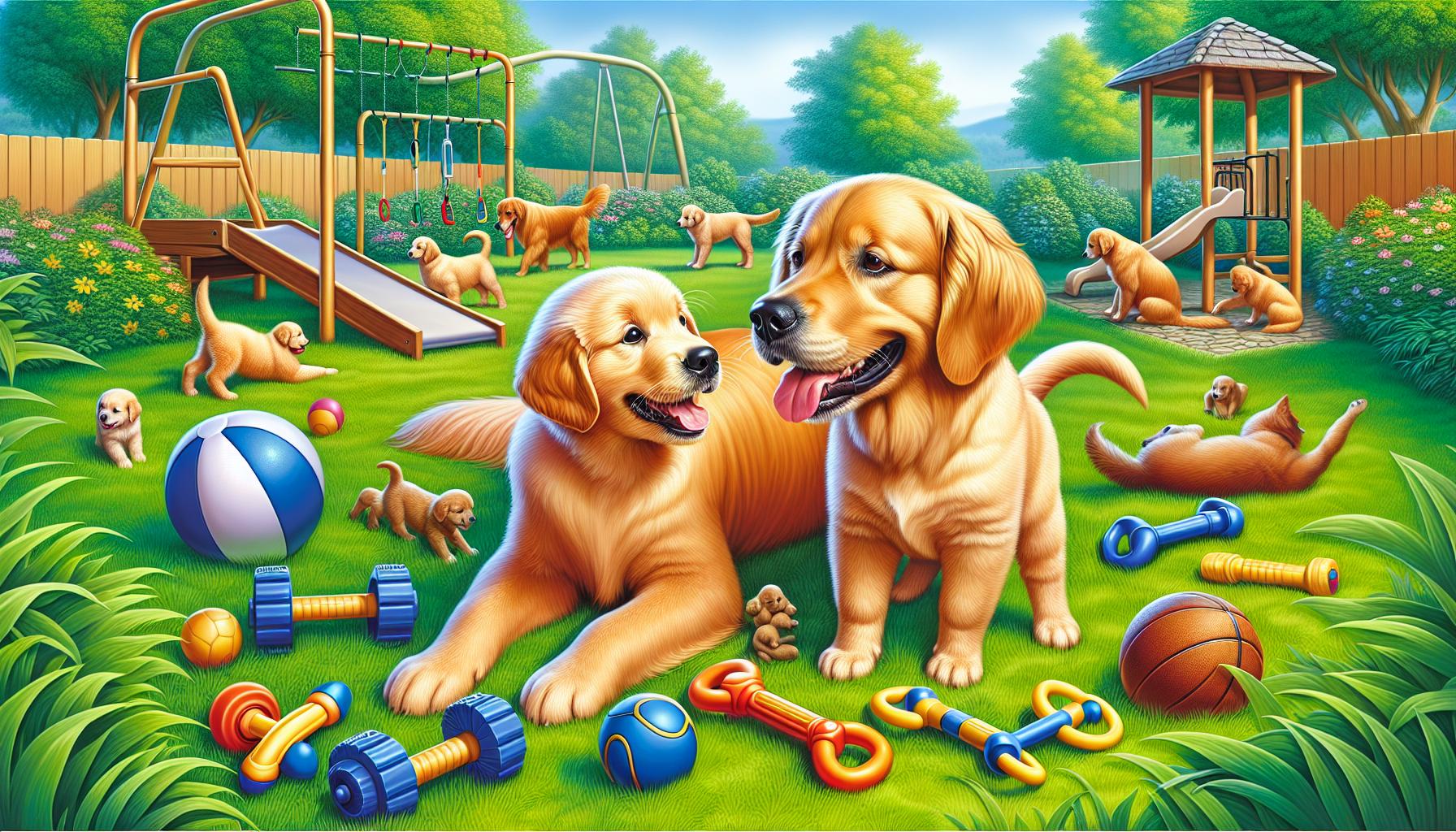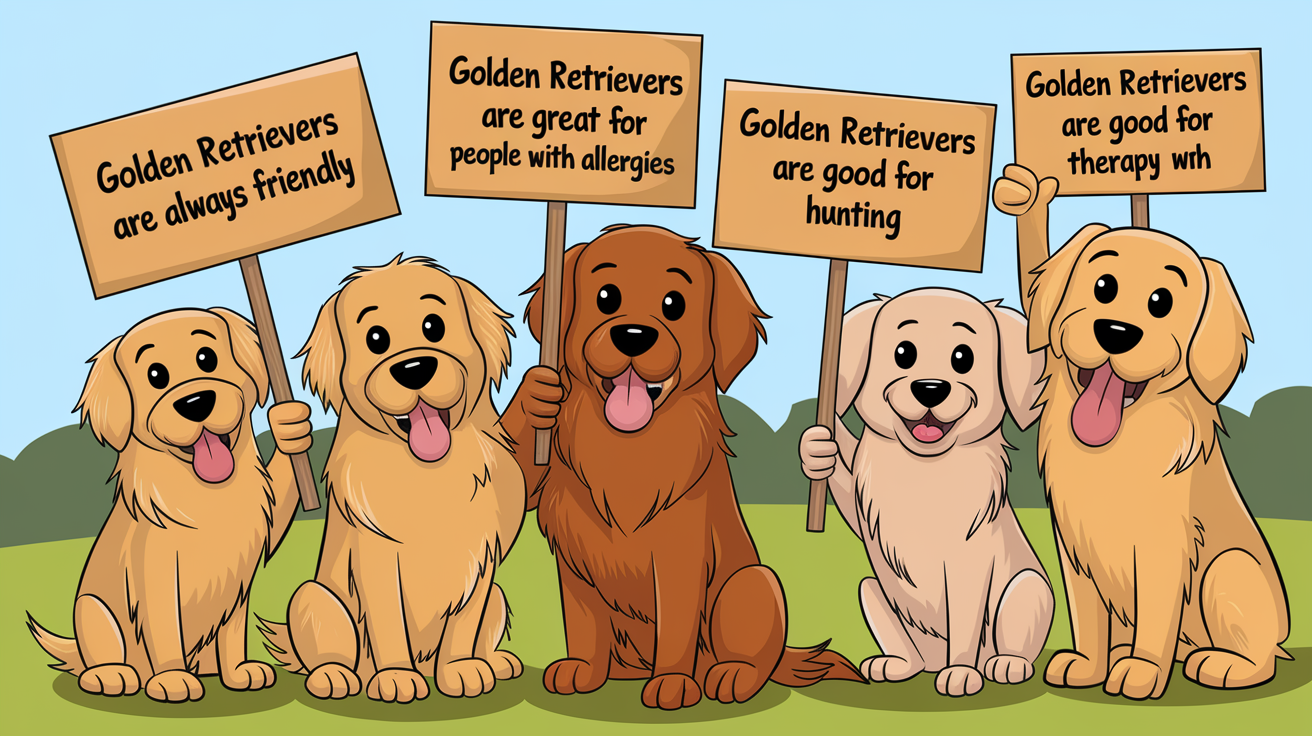Balancing Energy: Golden Retriever Puppies Vs. Adults. Golden retriever puppies are like furry bundles of boundless energy. I’ve always been fascinated by their playful antics and tireless enthusiasm. It’s like they’ve got an endless supply of batteries. But as they grow into adults, there’s a noticeable shift. I’ve observed this firsthand and let me tell you, it’s quite the transformation.
This change in energy levels from puppyhood to adulthood isn’t just interesting—it’s crucial for any golden retriever owner to understand. Knowing what to expect can help you better prepare for each stage of your furry friend’s life. Whether you’re a seasoned golden retriever owner or thinking about welcoming one into your home, understanding these energy dynamics is key to a happy, healthy dog.
Understanding Energy Levels in Golden Retriever Puppies
When I first brought my golden retriever puppy home, I was amazed at the bundle of energy I had introduced to my household. For any golden retriever lover, it’s essential to grasp the dynamic energy levels of these puppies. From my experience and extensive research, I’ve found that puppies have significantly higher energy levels compared to adults. This vigor is part of their learning and growing process.
Golden retriever puppies, typically between 8 weeks to 6 months old, are in a constant state of exploration and play. During this phase, their energy levels can seem limitless. They’re curious about everything, which translates into playful bouts that come in waves throughout the day. Here’s what I’ve observed:
- Morning and late afternoon are peak times for their playfulness.
- Midday and evening might see them winding down, possibly for naps.
This pattern aligns with their natural circadian rhythm, and adapting to it is crucial for any owner. Engaging in structured play and training sessions during their peak energetic times can significantly aid in their development. It’s not just about burning off that extra energy but also about mental stimulation.
Understanding and managing these energy levels is a key aspect of raising a healthy and happy golden retriever. Providing ample opportunities for play, socialization, and exploration during these early months will set the foundation for their temperament and behavior as they mature.
Factors Influencing Energy Levels of Golden Retriever Puppies

When analyzing the boundless vigor of golden retriever puppies, it’s essential to pinpoint the factors that mold their energy levels. From my experience, certain elements stand out, directly affecting how these pups expend their zest.
Diet and Nutrition: The fuel a puppy receives has a staggering impact on their vitality. High-quality, balanced diets are paramount for sustaining their energy throughout the day. Puppies, especially golden retrievers, require a diet rich in proteins and fats to support their rapid growth and high energy expenditure.
Physical Exercise: It’s no secret that activity levels are directly proportional to a puppy’s energy levels. Golden retriever puppies thrive with regular, structured playtimes and exercise. Too little activity can lead to pent-up energy, while too much can exhaust them and possibly harm their developing bodies.
Rest and Sleep: Contrary to what some might think, adequate rest is crucial for maintaining a puppy’s energy. These growing dogs need ample sleep to recover from their active periods; hence, a disrupted or inadequate sleep pattern can significantly affect their energy levels.
Mental Stimulation: Golden retriever puppies aren’t just physically active; they’re incredibly sharp and need constant mental engagement. Puzzle toys, training sessions, and interactive games help tire them out mentally, contributing significantly to managing their overall energy.
Understanding these factors can incredibly aid in harmonizing with your puppy’s energy levels, ensuring they’re neither overstimulated nor bored. It’s about striking the right balance to foster a healthy, happy, and energetically balanced golden retriever puppy.
Transitioning from Puppyhood to Adulthood: Energy Changes

As a long-time aficionado of Golden Retrievers, I’ve closely observed the energy transitions these dogs undergo from puppyhood to adulthood. I’ve discovered a fascinating journey of change that all Golden Retriever owners should be aware of.
In the early months, Golden Retriever puppies are balls of energy, needing frequent engagement to burn off their excitement and curiosity. This phase is crucial for their development, both physically and mentally. Their boundless energy can sometimes feel overwhelming, but it’s also a beautiful period of bonding and learning.
However, as they transition into adulthood, typically around 18 to 24 months, a noticeable shift in energy levels occurs. It’s not just about them calming down; it’s a transition into a mature phase where their energy becomes more balanced. Adult Golden Retrievers maintain their playfulness and zest for life but in a more composed manner. They’re still eager to please and engage in activities but they also cherish their moments of rest.
| Age Group | Energy Level Description |
|---|---|
| 0-6 months | Very high energy, curious, and needs constant stimulation |
| 6-18 months | High energy, learning quickly, needs structured exercise |
| 18-24 months | Starts transitioning, energy levels begin to balance |
| 24+ months | Balanced energy, still playful but more composed |
Proper nutrition, continuous training, and adequate mental stimulation play pivotal roles in managing these energy shifts. Adjusting their diet to match their energy needs and ensuring they get regular, varied forms of exercise is key. Moreover, keeping their minds active with training and puzzle toys can help smooth the transition.
Understanding these energy level changes provides insights into their needs at different life stages, allowing us to better support our beloved Golden Retrievers as they grow.
Managing Energy Levels in Adult Golden Retrievers

When my Golden Retriever transitioned into adulthood, around 18 to 24 months, I noticed a distinct shift in their energy levels. They became more composed yet still required adequate exercise to stay healthy and happy. It’s imperative for us, the owners, to adapt our strategies to keep their energy levels managed well. Here’s how I navigated through this phase.
Adjust Exercise Routines
Adult Golden Retrievers still need considerable exercise, albeit slightly less intense than their younger selves. I found that 1 to 2 hours of daily physical activity strikes the perfect balance. Activities like brisk walks, moderate hiking, and fetch in the park keep them engaged and fit without overdoing it.
Incorporate Mental Stimulation
I can’t stress enough how vital mental stimulation is for an adult Golden Retriever. It keeps their mind sharp and prevents boredom. Puzzle toys, obedience training, and new tricks are excellent ways to challenge their brain. This aspect of their care ensures they’re not just physically tired but mentally satisfied too.
Monitor Nutrition Closely
As their energy requirements adjust, so does their diet. Adult Golden Retrievers don’t need as many calories as they did in their puppy phase. I meticulously monitor their food intake, ensuring it’s high-quality and suits their less active lifestyle. Portion control is key to preventing weight gain, which can lead to health issues.
Integrating these strategies into my daily routine with my Golden has been a game changer. By focusing on balanced exercise, mental stimulation, and proper nutrition, managing their energy levels became much more straightforward. Not only has it kept them physically fit, but it’s also contributed significantly to their overall well-being.
Tips for Balancing Energy Levels in Golden Retrievers
When it comes to balancing the energy levels of my Golden Retriever, I’ve found that a mix of physical exercise, mental stimulation, and consistent routine works best. First off, setting a daily exercise schedule is crucial. Golden Retrievers are known for their high energy levels, and without proper exercise, that energy can turn into destructive behavior. Here’s a quick snapshot of what I’ve learned works best for exercise:
- Puppies: 5 minutes of exercise per month of age, twice a day.
- Adults: At least one hour of physical activity daily.
Next, I incorporate mental stimulation into the routine. This can be through puzzle toys, training sessions, or interactive games like hide-and-seek. Golden Retrievers are intelligent dogs and thrive when their minds are engaged.
I also focus on maintaining a consistent routine for feeding, walking, and playtime. This predictability helps manage their energy since they know what to expect and when. For their diet, I ensure it’s high-quality and suited to their life stage, whether they’re a bouncy puppy or a more laid-back adult. The right nutrients play a vital role in their overall energy levels.
Remember, every dog has its unique personality and energy levels. What works for one might not work for another, so it’s all about finding the right balance that keeps your Golden Retriever happy and healthy.
Conclusion
Navigating the energetic waters of a Golden Retriever’s life from puppyhood to adulthood can seem daunting. Yet, armed with the right mix of physical activity, mental challenges, and a steady routine, it’s entirely possible to maintain a harmonious household. Remember, the key is in tailoring these elements to your dog’s specific needs and life stage. High-quality nutrition also plays a pivotal role in keeping their energy levels in check. While the journey of finding the perfect balance may vary from one Golden Retriever to another, it’s a fulfilling path that leads to a happy, healthy companion by your side. Trust in the process, stay consistent, and you’ll discover the joy of witnessing your furry friend thrive at every stage of their life.









